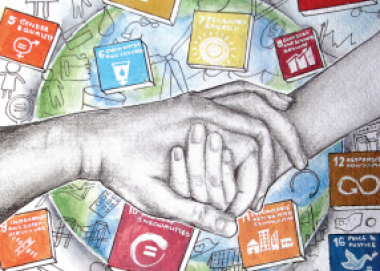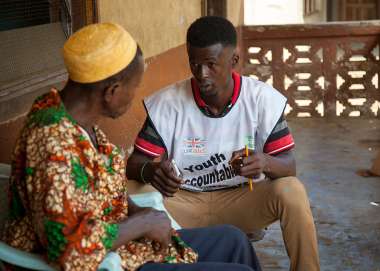Faith-based organisations contribute to sustainable development in important ways. They provide healthcare and education, and are often among the first to respond to humanitarian crises. But their role in challenging inequality is less strong, and in the area of gender justice, they are often part of the problem. At Christian Aid, we are working to ensure that this changes.
Fight inequality
According to the Fight Inequality Alliance, 26 people now hold the same wealth as the 3.8 billion poorest people.
As the super-rich once again gather for the World Economic Forum, the Alliance is coordinating a week of action on rising inequality, amplifying the diverse voices of people standing up for human rights and justice.
Prioritise gender inequality
Christian Aid has long fought to challenge inequalities in wealth and power within and between countries. With many movements and people, we share the concern that the current economic system is broken. We believe that the systems and structures that enable a minority to capture wealth and exclude millions from decision making must end.
We know that all causes of all inequality must be addressed. But we believe that if the aims of the Sustainable Development Goals to leave no-one behind and achieve human rights for all are to be realised, we must prioritise action to end the most pervasive form of injustice – that between women and men.
During my time with Christian Aid, I’ve seen how discrimination and lack of representation and voice keep women and other marginalised people poor, even where there have been significant improvements in national wealth and economic development.
According to UN Women, worldwide there are 122 women aged 25 – 34 living in extreme poverty for every 100 men of the same age group. Laws in most countries fail to give women equal rights to men or protect them from violence. Women overwhelmingly continue to shoulder the burden of unpaid domestic and care work. The result is that, as more women take up work outside of the home, they enter labour markets on unequal terms, taking up jobs that are all too often low paid and exploitative. This is particularly the case for women from socially excluded or minority groups.
The experience of our partners in the global South, and the communities they work among, has shown me why ending discrimination and social exclusion and ensuring marginalised voices are heard must be central to our work.
Faith and gender inequality
Twenty-five years ago, the Beijing Declaration and Platform for Action – a visionary agenda for gender equality – was adopted by 189 governments. Alongside this, the Global Conference on Population and Development recognised the importance of sexual and reproductive health rights to development.
It seems staggering that today, we are still fighting to ensure these important agendas get attention, resources and political will. The influence of those who would block progress on women’s rights and gender equality are among the many barriers, and religious institutions which are shaped by patriarchal structures have often been among them.
We denounce the trends of fundamentalisms (religious, political and economic) which promote messages that are incompatible with human rights and enable the maintenance of power structures that only serve a few privileged individuals and groups … We also reprehend all speech and practice perpetrated or condoned by those reinforcing sexist stereotypes that go against women's rights, sexual diversity, tolerance and love.
It is precisely for these reasons that we think that faith actors have a responsibility to always promote progressive gender norms, challenge harmful practices, and amplify the voices of women from minority groups to address their multiple inequalities. This is the main message of our forthcoming report, which we are preparing for the 2020 UN Commission on the Status of Women in March. It discusses how faith-based organisations have seen both the positive and negative roles that faith actors can play.
We need to integrate work on faith narratives in the more specific equality work we are doing, not only to address regressive faith voices, but also ensure that we have positive faith action
Our report will highlight the need to make progress on all 12 critical areas identified in the Beijing Declaration and identify and prioritise the most marginalised groups of women.
It also calls faith-based actors to push back against all discriminatory practices and ultra-conservative ideologies, including those supported by some churches. Many faith-based organisations and actors are strongly embedded in communities around the world where they are well placed to influence norms, attitudes and practices that keep women behind. They can and must uphold women’s rights.



